Former small-town MN mayor is behind the rise of electoral activism in SD. He's just getting started
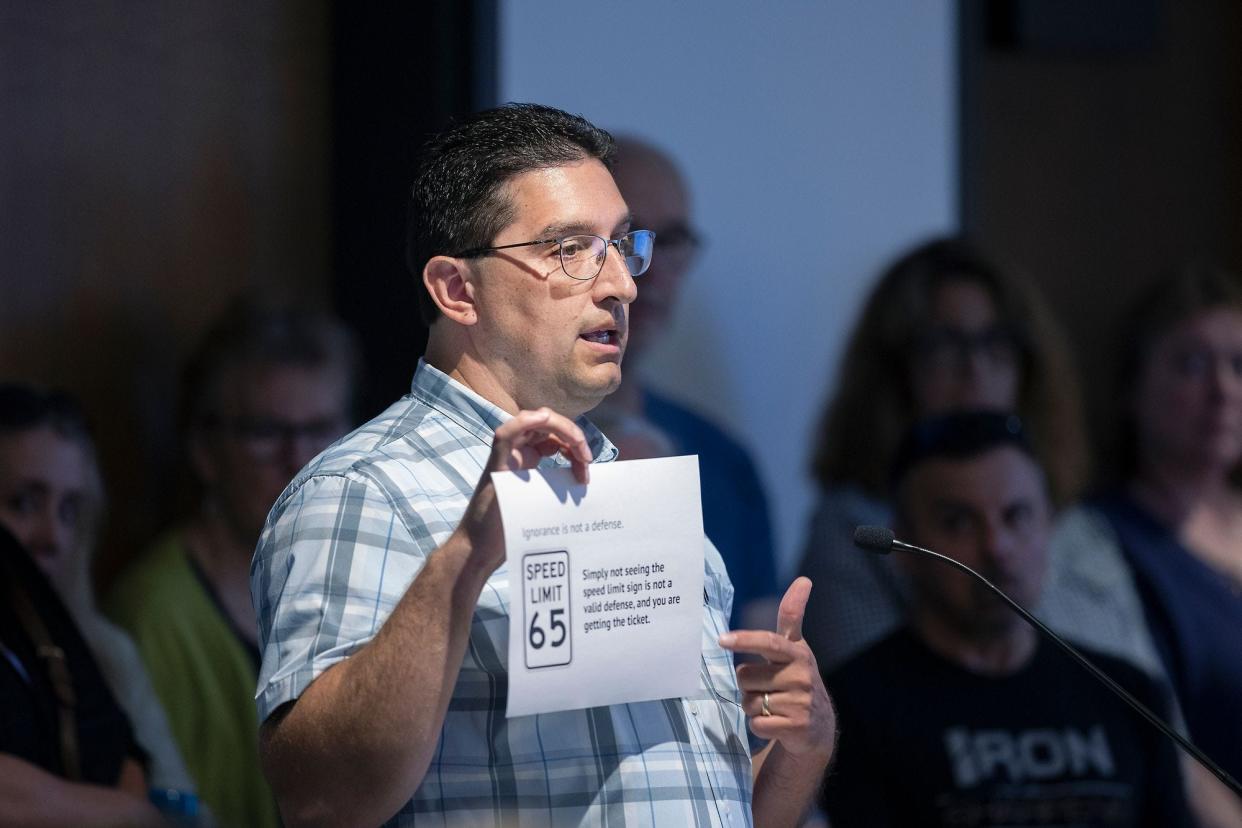
- Oops!Something went wrong.Please try again later.
- Oops!Something went wrong.Please try again later.
One of the Midwest’s most prominent election deniers stood next to a pinball machine at the Military Heritage Alliance in Sioux Falls in October, outlining how he impacted South Dakota’s 2022 race for secretary of state.
Rick Weible, a 51-year-old computer analyst and Republican Party operative, had just given a slideshow to a group called Concerned Citizens of Lincoln County about alleged fraud in the 2020 presidential election and perceived vulnerabilities in South Dakota’s voting systems.
The former small-town mayor from Minnesota, who now lives in the eastern South Dakota town of Elkton, spoke with News Watch after the presentation. He said that he initially saw himself as a potential candidate to challenge incumbent Secretary of State Steve Barnett at the 2022 state GOP convention.
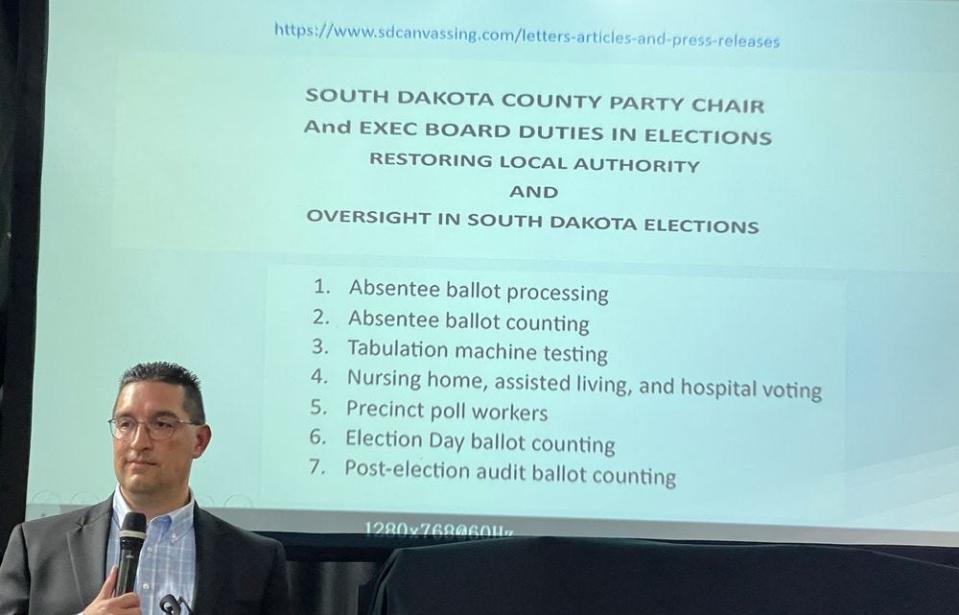
Then Weible and his wife, Gretchen, met Monae Johnson, a more palatable nominee because she previously worked in the secretary of state’s office. Johnson, who declared her candidacy in February 2022, had publicly expressed doubts about the validity of the 2020 election, refusing to acknowledge President Joe Biden’s win over former President Donald Trump.
The Weibles, who moved to South Dakota from Minnesota as “tax refugees” in 2018, viewed Johnson as someone who could help them reform the system from within.
But as Republicans approached the June convention in Watertown and prepared to select nominees for offices such as secretary of state and attorney general, Weible saw problems with Johnson’s political effort.
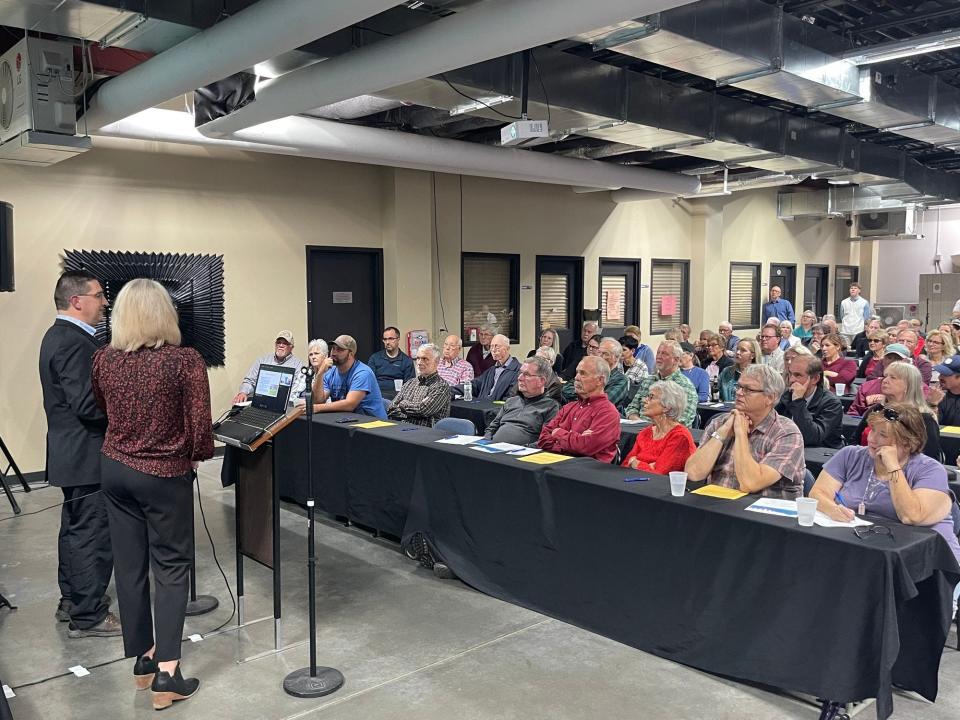
“We found out her campaign was a complete fraud,” said Weible, who runs a cyber security business called D3Defense in Brookings. “She didn't have a campaign speech, so I had to write one for her. She didn't have room reservations. She had no T-shirts, no signs, no buttons. She wasn't even totally sure of the rules of the convention.”
Johnson declined an interview request with News Watch for this story. In response to a question about Weible, Director of Elections Rachel Soulek sent a statement that the Secretary of State's office is “constantly combatting misinformation and disinformation regarding elections. We encourage voters to turn to their trusted sources for election information, which are the Secretary of State’s Office and our county auditors.”
Gretchen Weible became Johnson’s campaign manager and Rick served as adviser. They found plenty of far-right delegates receptive to the premise that Barnett had been slow to respond to concerns about online voter registration, drop boxes and machine tabulators in South Dakota.
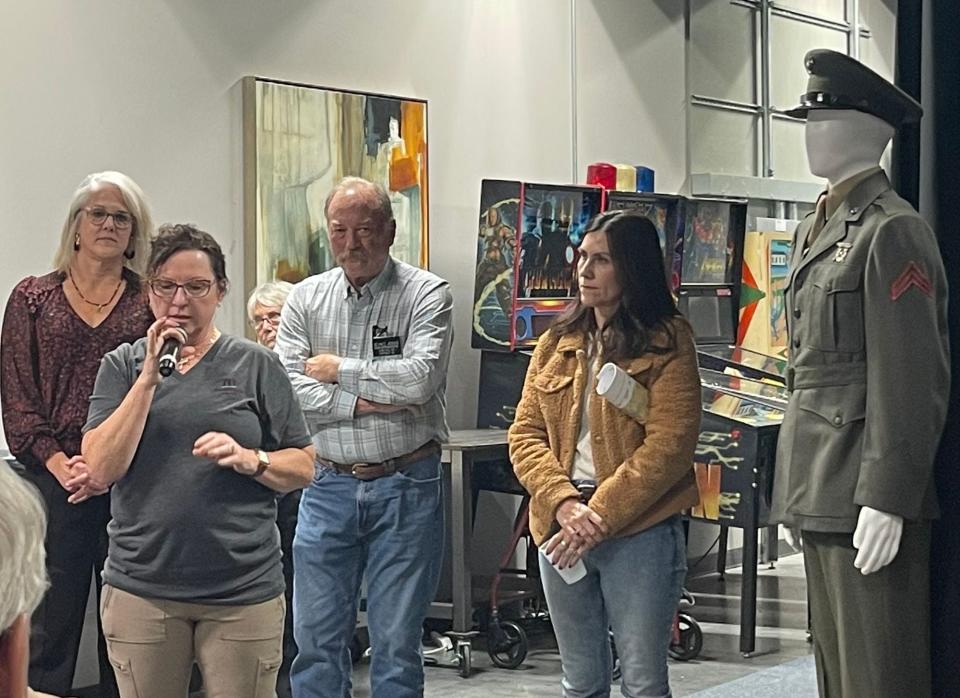
Boosted by the South Dakota Freedom Caucus, Johnson defeated Barnett with 61% of the vote – a shocking rebuke for an incumbent – and vowed to make election security her top priority.
When Johnson cruised past Democratic challenger Tom Cool in the November General Election, Rick and Gretchen Weible stood behind her as she gave her victory speech, confident that at least part of their vision to overhaul election laws in South Dakota was taking shape.
“I was upsetting the apple cart,” Weible said of that election. “I brought my Minnesota experience into South Dakota because I was thinking, ‘If I can’t fix Minnesota, how can I get involved somewhere else to force some of these changes?’”
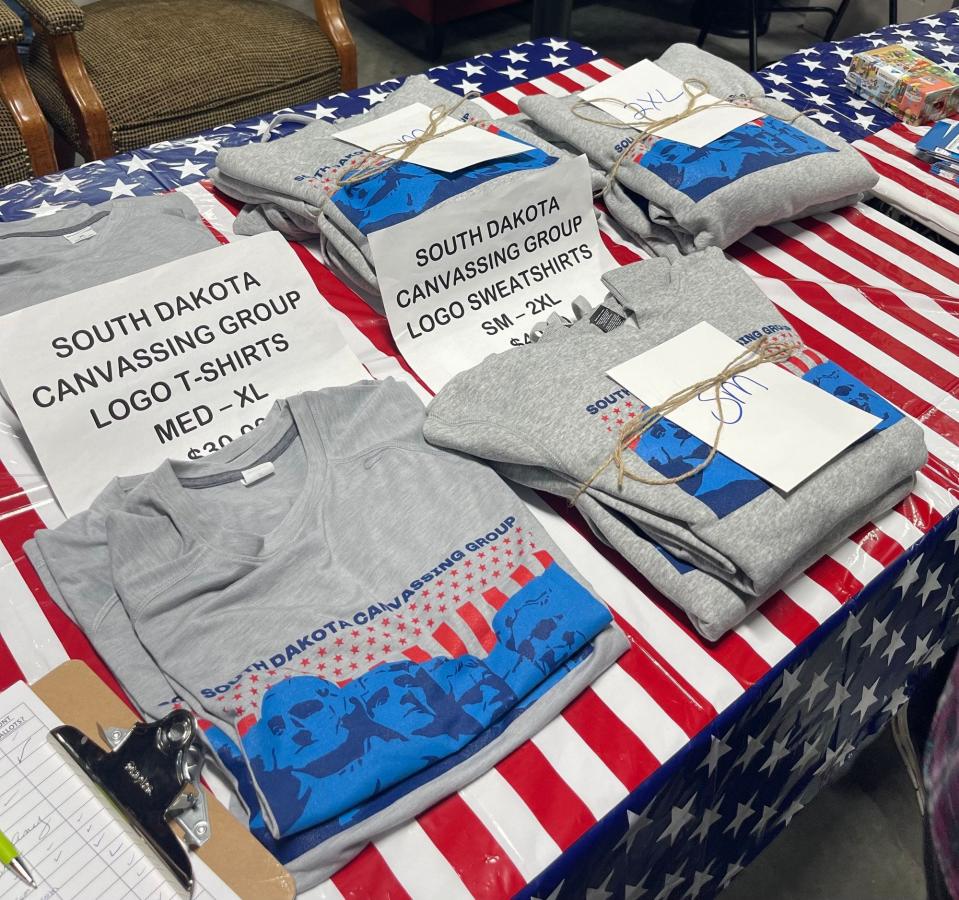
More than a year later, as electoral activism gains steam in legislative hearings, county commission meetings and citizen gatherings across the state, Rick Weible’s influence is hard to deny.
The grassroots crusade is sparked by accusations of election improprieties that cost Trump the White House, despite no evidence of substantial voter fraud from Democratic or Republican election leaders.
Trump and his supporters have filed and lost more than 60 lawsuits relating to those claims. And the former president faces criminal charges for trying to overturn election results in Georgia, a key swing state. Trump also was indicted by a federal grand jury on charges related to the Jan. 6, 2021, riots at the U.S. Capitol and efforts to remain in power after the 2020 election.
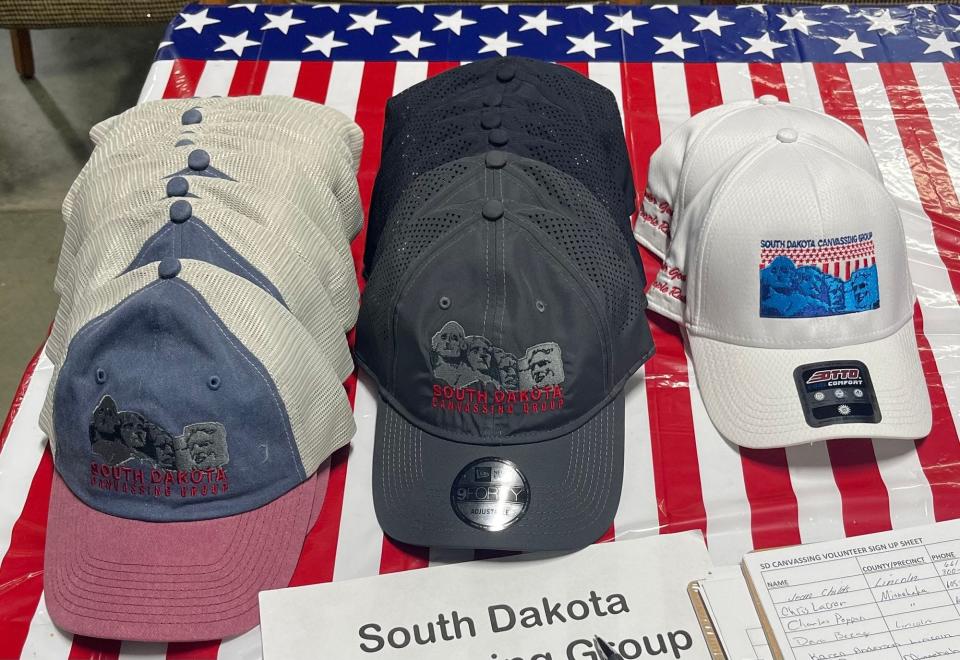
Still, a CNN poll from August found that 69% of Republicans and Republican-leaners said Biden’s win was not legitimate, up from 63% earlier in the year.
The South Dakota movement takes these unfounded allegations of rigged voting systems and projects them onto local elections. Citizen collectives such as the South Dakota Canvassing Group and Midwest Swamp Watch put county auditors, commissioners and poll workers on the defensive by echoing accusations from far-right media and demanding proof of secure systems, even in a state that Trump won by 26 points in 2020.
“When we think of free speech and the marketplace of ideas, we say good ideas rise to the top. But the inverse is also true,” said Joe Kippley, a Republican Minnehaha county commissioner.
“Sometimes they’re just bad ideas. And when people advocate for bad ideas, they come through loud and clear too. In the end, it's a trust-in-institutions question. Are we doing our best to build up trust in our institutions? Or are we looking to sort of ride the populism of the moment and say we didn't come out on the winning side, so let's burn it all down?”
Rick Weible countered by saying that many public officials don’t grasp the inner workings of South Dakota’s Election Systems & Software (ES&S) process.

He wants more election transparency through the public release of cast vote records and proof that tabulating machines are not connected to the internet, protecting them from hacking. Hand counts are one way to secure elections, he said, as are stricter voter registration laws and post-election audits.
Gov. Kristi Noem and the South Dakota Legislature have been generally receptive to the message.
The state banned drop boxes during the 2023 legislative session and passed bills that addressed voter-roll updates, residency requirements, post-election audits and the testing of tabulation equipment.
For Rick Weible, who remains vocal in pushing for reforms with legislators and the South Dakota Board of Elections, crossing the border from Democratic-controlled Minnesota into Republican-dominated South Dakota has helped amplify his agenda.
“Any business expert is going to tell you that it makes sense to hunt where the ducks are,” said Charles Stewart, a political science professor at the Massachusetts Institute of Technology who specializes in election technology and administration.
“Election denialism presents an opportunity to build a movement around restricting voting access and turning back the clock on a variety of electoral innovations. The places that are generally going to be the most receptive to that message are rural-based Republican states.”
— This article was produced by South Dakota News Watch, a non-profit journalism organization located online at sdnewswatch.org.
This article originally appeared on Sioux Falls Argus Leader: Former Minnesota mayor takes on electoral activism in South Dakota

